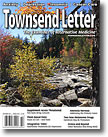


From the Townsend Letter |
||||
Letter from the Publisher FDA Guidance Threatens Supplement Industry by Jonathan Collin, MD |
||||
In July, the US Food and Drug Administration (FDA) drafted a guidance document for industry on dietary supplements. Although the document is a draft with "non-binding" recommendations, the wording is very formal and appears ready to be implemented. The "guidance" calls for manufacturers of food supplements to report to the FDA the ingredients of all supplements marketed after 1994. The purpose of the report is to notify the FDA that food supplement ingredients are being manufactured by a specific company and to provide data to the FDA that the "new dietary ingredients" (NDIs) are safe. The guidance draft differentiates between a dietary ingredient that is wholly derived from a food and an ingredient that has undergone chemical processing. In the event that there has been enzymatic or chemical manipulation of the food or botanical ingredient, a statement is required explaining the exact manufacturing process. As a whole, the reporting process appears to be more than onerous and time-consuming – for those "new dietary ingredients" that lack safety documentation based on historical use, the FDA is requiring expensive, multistep, multiorganism, lengthy safety studies. It is hard to imagine that food supplement manufacturers and/or distributors would be capable of organizing, financing, and carrying out the aforementioned safety studies. It is evident that the FDA's intent is to set up egregiously overwhelming NDI safety requirements. While these requirements may make sense for a new drug or biologic agent, clearly they make little sense for food supplements. The Centers for Disease Control's reporting of poisoning from the use of food supplementation has consistently shown that extremely few incidents have occurred. Toxicity data from use of food supplementation has historically shown minimal incidents of adverse effects. To apply the same standards to food supplements as to drug agents is ridiculous. If drug companies were obliged to sell new drugs in the $20 to $60 range with competition from a myriad of other manufacturers, there would be no business of new drug design. Drug companies manufacture drugs because they receive patent rights to their new drug agents and they can market the drugs for hundreds if not thousands of dollars each month. Such is not the case for food supplement manufacturers. While the intent of the FDA to regulate food supplements deserves some merit, this guidance draft has set the requirements for safety impossibly high to comply with. The FDA should limit safety requirements to documentation from historical use. Once the safety of a dietary ingredient has been established, that information should be sufficient for all supplement manufacturers to use; it is ridiculous that individual companies need to do their own safety studies on the same ingredient. Given that accomplishing these safety studies will require great expense, the FDA should be obligated to set up the testing facilities for these studies and provide financing to do them. Jonathan Collin, MD Notes
|
||||
![]()
Consult your doctor before using any of the treatments found within this site.
![]()
Subscriptions are available for Townsend Letter, the Examiner of Alternative Medicine magazine, which is published 10 times each year.
Search our pre-2001
archives for further information. Older issues of the printed magazine
are also indexed for your convenience.
1983-2001
indices ; recent indices
Once you find the magazines you'd like to order, please use our convenient form, e-mail subscriptions@townsendletter.com, or call 360.385.6021 (PST).
Who are we? | New
articles | Featured topics |
Tables of contents | Subscriptions | Contact
us | Links | Classifieds | Advertise | Alternative
Medicine Conference Calendar | Search site | Archives |
EDTA
Chelation Therapy | Home
© 1983-2011 Townsend Letter for Doctors
& Patients
All rights reserved.
Website by Sandy Hershelman
Designs
October 17, 2011
![]()

